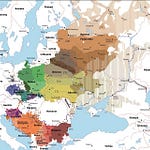This week on Unsupervised Learning, researcher, blogger, and essayist Tanner Greer joins Razib to consider the challenges facing conservatism in America today, the future of China and its relationship to the US. Much of Tanner’s extensive research and analysis are featured on his excellent weblog, The Scholar’s Stage, and the conversation also touches on the current state of blogging (and its past).
Razib and Tanner first tackle the evolution of a new strand of modern conservative thought that has labeled itself the ‘New Right’ which, despite the recycled name, was not intended to suggest any relationship to the previous ‘New Right’ of the 1960’s through the 1980’s – that culminated in Reaganite conservatism. Apparently, the 25-year-old staffers and writers who are promoting the New Right have no clear memory, let alone awareness of the movement of the same name that dominated the last third of 20th-century politics in America. Either that or they lack the creativity to come up with something original.
Rather than being a reaction to a movement that young conservatives don’t remember, the 2020’s New Right grows out of a rejection of the Neoconservatism of the turn of the millennium and the libertarianism that failed to meet the challenges of the 2008 financial crisis. Tanner and Razib draw on the works of historians David Walker Howe and David Hackett Fischer to examine how the constitution of the New Right may have its roots in American history. But the New Right is less a grassroots movement than a collection of intellectuals gathering around journals and think tanks. It takes a suspicious view of the valorization of individualism that typified 20th-century conservatism, but its relevance to populist mass politics remains to be seen.












